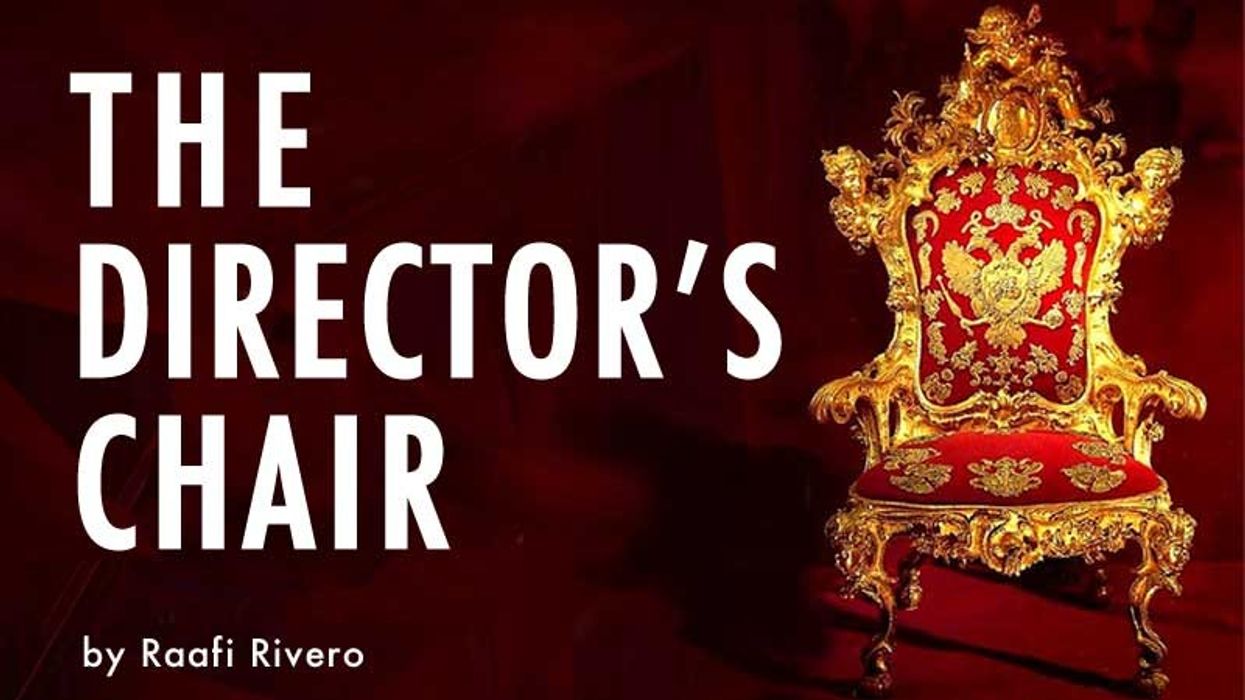This is the first in a series of guest posts by filmmaker Raafi Rivero.
In this series of posts I intend to address a topic which is both critical and sorely overlooked in the current crop of filmmaking blogs: how to, you know, direct.
Specifically, I will tackle directing actors and all non-technical aspects of the craft. Koo has done (and continues to do) a tremendous job of culling through the vast amounts of tech out there, making recommendations, and pointing out best practices. I will address the aesthetic aspects of the craft. During this series of posts I will point to experiences of my own and of filmmakers I know. The goal is to be informative and instructive.
If the tone of these posts strikes you as a bit forward, that's because they are borne out of a frustration with seeing too many of us make the same rookie mistakes. But also from having made so many of them myself and taking so long to course-correct. This is part-tract, part-diatribe, part-diary. But if you want to make yourself a better director, read on.
If you're the person sitting in the canvas chair, directing actors is your biggest responsibility. Your DP is a filmmaker, your producer is a filmmaker, heck, your sound guy is a filmmaker. But it is no one else's job on set to direct the actors. This ultimate responsibility over the performances in the film is the single most important thing that you do on set. Not the look (DP), not the locations (production), but the acting (director). It is your job to mold the performances into something funny, heartwarming, off-putting... whatever, but above all: believable.
How many times have you watched someone's 5D camera test on vimeo and clicked off halfway through? Sure the images look great, but after a minute or so, who cares? At this point everybody should be able to achieve great looking pictures. That's what Koo is helping you to do on this site. What's worse: how many times have you watched someone's short film and checked out halfway through? Even some of the big, famous guys in the blog world who we can't even name? Bad acting will kill your movie faster than anything else except for bad sound. But how do you work with actors?
"I talked my way through that film."
- Tanuj Chopra
That gem was dropped by a buddy of mine while explaining his process. No piece of advice has meant more to me on set.
Talk your way through it
Your job as a director is as a communicator. You communicate with every department constantly: between locations, setups, takes. And no place is this more essential than with your actors.
Some directors are disdainful of the performers; Hitchcock was notorious for this:
[youtube https://www.youtube.com/watch?v=8-nlObHw7bE#t=3m38s When it comes to your own directing, don't be disdainful of your performers. At this stage in our careers, actors can be the single greatest resource we have. On big-time sets with big-time egos and people with jet-setting schedules there's no time for rehearsal. Everything happens on set through retakes and with a few days of prep. We have the LUXURY of rehearsing with actors. Of getting things right in the weeks and months before production instead of the days and hours. This is a huge advantage we have as Indies. Don't give this up! expand=1 site_id=26256498]
Our advantage comes from the fact that there are good actors out there who are just as hungry to work and practice their craft as we are. They WANT to work with good directors and build complex characters. These are the people taking days off of work, going out to auditions every day, and slipping into acting classes in the evenings. Go find these people. Believe me, they want to hear from you.
A good performer can paint in a whole story with a bare minimum of extras. That's why sketch comedy works. And off-Broadway theater. A good director supplies the vision. And the place where everything starts is probably an empty room somewhere with a couple of chairs. Talking about your movie.
Communicating with actors means being available as the ultimate authority on the story: how it should move and feel at any moment of its duration. This is not to say that you won’t make discoveries on set, or that ideas won’t occur later in the editing room. But while you have the opportunity to communicate your vision to the breathing human beings who are the faces of it, it is your responsibility to draw out their best work. When communication flows both ways between actor and director, everyone involved will be able make important discoveries about the material.
Do that well, and the audience won't be able stop talking about it either.
Next time: the rehearsal process. To see all the posts in this series (to date), click here.
Raafi Rivero is a filmmaker and designer living in Brooklyn, NY. In between stints slaying dragons and leaping small puddles in a single bound, he's managed to snag a couple of industry honors and is hard at work on the upcoming feature How to Steal. Raafi has directed content for HBO, Sony, and Discovery as well as shady record labels and satisfied customers the world round. His short, Their Eyes Were Watching Gummy Bears, will play festivals this summer. Follow Raafi on Twitter here.












